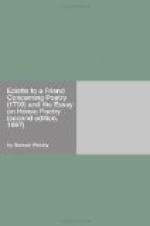by the adulterous mixture of ’tis hard to say
how many Languages: So that between ’em,
they’d make it impossible for a Christian Poet
to write a good Heroic Poem, or even a Tragedy, on
any, but profane Subjects; by taking away all the
Machines, and therein whatever is admirable. No,
says Balzac, instead of those hard Words and proper
Names, Appellatives may be chosen, Words common to
all People: As for example, Ill luck instead of
the Fates, and the Foul Fiend for Lucifer; and whether
this wou’d not sound extreamly Heroical, I leave
any Man to judge: It being besides certain, that
’tis singulars and particulars which give an
Air of Probability, and the main Life and Beauty to
a Poem, especially of this Nature; without which it
must of necessity sink and languish. However so
much of Truth, I must confess, there is in what he
says, that I verily believe Magor-missabib, or Mahershal-alhashbaz,
wou’d scarce yoke decently in one of our Pentameters,
but be near as unquiet and troublesome there, as a
Mount Orgueil it self. Nor can partiality so
far blind my Judgment as not to be my self almost
frighted at second hearing of such a thundering Verse,
as Belsamen Ashtaroth Baaltii Ba’al: Which
seems as flat Conjuration, as Zinguebar, Oran, &c.
tho’ ’tis now too late to amend it.
But then there are other Words or a more soft and
treatable Cadence, even in the same Hebrew Language,
especially when mollified by a Latin or Greek form,
or Termination; and such as these one may make use
of and let others alone: though neither is our
bolder rougher Tongue so much affrighted at them, as
the French and Latin.
But Boileau pushes the Objection further, and wou’d
make it bear against the Things as well as Words,
persuading himself,
Our God and Prophets that he sent,
Can’t act like those the Poets did
invent.
Tho’ he too, is short in History, how excellent
soever in Poetry. For first, the Heathen Poets
did not invent the Names of their Gods and Heroes,
but had ’em from Eastern Tradition, and the Phenician
and Jewish Language, tho’ deflected and disguis’d
after the Greek and other Forms, as Josephus tells
us, which the learned Bochart has proved invincibly;
and I have made some Essay towards it, in my Sixth
Book. Nay further, it seems plain to me, that
most, even of their best Fancies and Images, as well
as Names, were borrow’d from the Antient Hebrew
Poetry and Divinity, as, were there room for’t,
I cou’d, I think, render more than probable,
in all the most celebrated Strokes of Homer, moat
of the Heathen Poetical Fables, and even in Hesiod’s
blind Theogonia. Their Gods or Devils, which you
please, were not near as Antient as the Hebrews.
The Word Satan is as ancient as Job; nor can they
shew us a Pluto within a long while of him. Ashtaroth,
and Astarte, are old enough to be Grandmothers to their
Isis, or Venus, and Bel, of the same standing with
Idolatry. Lawful it must certainly be, to use
these very Heathen Gods in Christian, since they were




